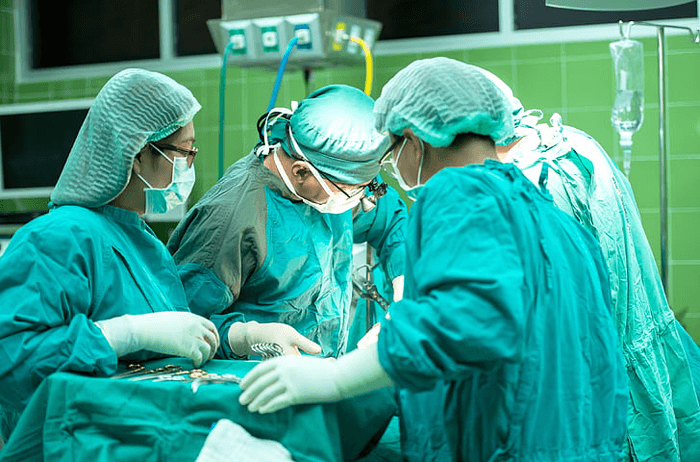Employers and Universities: Work with us?

How to become a surgeon
Surgeons save lives, fix injuries, reduce suffering and pain and treat life-limiting medical problems. Becoming a surgeon requires deep knowledge and advanced skills, which means it takes many years of training - 16 years in fact!
In this article, we explore how to become a surgeon - from what the role involves to the training and qualifications required, the salary you can expect to earn and typical career progression.
'How to become a surgeon'
What is a surgeon?

A surgeon is a highly trained medical professional who carries out operations and procedures known as “surgery”. The Royal College of Surgeons (RCS) recognises 10 specialties of surgery:
- Cardiothoracic: Heart, lungs, oesophagus and chest.
- General: Covers other categories, often emergency.
- Neurosurgery: Brain, central nervous system and spinal cord.
- Oral and maxillofacial: Facial bones, face and neck.
- Otolaryngology: Head and neck region, skull base and facial plastic surgery.
- Paediatric: Diseases, trauma and malformations of childhood years which spans foetal period (a baby before it has been born) to teenage years.
- Trauma and orthopaedic: Bones, joints and their associated soft tissues, including ligaments, nerves and muscles.
- Urology: Kidney, bladder and urinary problems, as well as men’s sexual and reproductive health.
- Vascular: Veins and arteries.
- Academic: Some clinical work, alongside research or teaching in a higher education setting.
What does a surgeon do?
In this video, Duncan talks about his career as a surgeon, explaining that day-to-day his job typically involves:
- Patient appointments in the morning. Duncan may see around 10 patients, some of whom he will examine to establish whether they need surgery.
- Surgery session in the afternoon, where he may carry out 3 operations or procedures.
Surgeons may also carry out line management and training of other team members.
A key part of a surgeon’s job takes place in the operating theatre, where they direct and perform operations on parts of the body to cure or treat illness and injury. This requires a high level of manual dexterity, patience and attention-to-detail as well as the ability to react to a changing situation and an intimate knowledge of human anatomy.
Surgeons are part of the surgical care team (SCT), which is made up of all the people needed to successfully carry out surgery. As well as the consultant surgeon and trainee surgeon, this includes:
- Advanced nurse associate
- Clinical practitioner
- Consultant anaesthetist
- Physician assistant (anaesthesia)
- Physician associate
- Physiotherapist
- Prescribing pharmacist
- Surgical care practitioner
- Surgical first assistant
Some of these colleagues are present in theatre, others support patients at different stages in their journey.
What skills do I need?

them are present during surgery
The job of surgeon requires advanced skills and knowledge. To become a surgeon, you will require mental, emotional and physical skills:
- Attention to detail
- Communication
- Compassion and understanding
- Good hand-eye coordination
- Initiative and the ability to think quickly
- Patience
- Problem-solving
- Steady hand and manual dexterity
What qualifications do I need?
To become a surgeon, you will need to progress through a long period of training made up of lots of different parts. This lasts around 15-16 years and includes:
- Medical school – 5-6 years: There are over 30 medical schools in the UK.
- Foundation training – 2 years: A paid training job in a clinical setting. You apply through the NHS’s UK Foundation Programme and are matched with a vacancy based on your application.
- Core training – 2 years: A paid training job in a hospital where you rotate around surgical specialties. You apply via the NHS’s Oriel portal.
- Specialty training – 6 years: This prepares you for one of the 10 specialties listed above and completes your surgical training. You apply via the NHS’s Oriel portal.
Once you have completed your surgical training, you can take the Fellowship of the Royal College of Surgeons (FRCS) exam. If you pass, you get the Certificate of Completion of Training (CCT) or Certificate of Eligibility for Specialist Registration (CESR). You are then added to the General Medical Council’s (GBC) register and you can apply for a consultant post.
What school subjects should I take?

To apply to medical school, you usually need to have A-levels (or equivalent qualifications) in chemistry and/or biology. Generally, you will also need A-levels in other science-based subjects such as physics or maths. Entry requirements are usually set at AAB or higher.
Carefully check entry requirements well before applying – and ideally before selecting your post-16 options – so you know what subjects and grades you are aiming for. The Medical Schools Council has a good course finder where you can filter by different kinds of qualifications to view entry requirements.
How much will I earn?
According to National Careers Service, a surgeon earns between £24,214 and £104,927. The higher end of this range applies to senior consultants.
How could my career progress?
Once you have completed your training, you will be added to the GBC register so you can apply for a consultant surgeon role, which means you will take overall responsibility for the standard of care received by patients supported by your team. You could go on to work on health policy for the government or a body such as RCS.
If you would like to learn more about careers in this field, check out Medicine & Healthcare Career Zone.
Images: Surgeons in theatre by Andy G via Flickr, students in science class by Tallis Photography via Flickr
